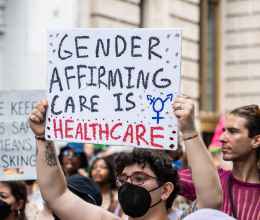
Today, the New Jersey Superior Court upheld an injunction blocking three Monmouth County school districts from implementing policies that would have forcibly outed transgender, nonbinary, and gender diverse students. This ruling is a major victory for transgender students, civil rights, and the fundamental principles of equality in our schools.
With up to 40% of homeless youth identifying as LGBTQ+, supportive school environments are even more important. This ruling ensures the Garden State’s schools will remain a safe and affirming place for transgender and gender diverse youth from unsupportive homes.
The court’s decision affirms that these policies likely violate the New Jersey Law Against Discrimination and would have caused irreparable harm to transgender and gender diverse students by forcing them to come out before they were ready, putting their safety and well-being at risk. The court agreed that because the policies, and by extension their harms, could only be applicable to transgender and gender diverse youth, the policies were discriminatory. As the court recognized, students should never face a different set of rules because of their gender identity or expression.
The court also rejected arguments that the injunction violates parents’ rights under the 14th Amendment or federal and state student record laws. In the decision, the court correctly acknowledged that the current policies do not prevent parents or guardians from accessing student records.
This victory for equality would not have been possible without the dedicated advocacy of New Jersey Attorney General Matthew Platkin, the New Jersey Division on Civil Rights, and Lowenstein Sandler LLP, who represented Garden State Equality and the ACLU of New Jersey as amici in this case. Their tireless work helped ensure that transgender and gender diverse students in New Jersey retain their right to privacy, dignity, and equal treatment under the law. We also commend the ACLU-NJ for their steadfast leadership in advancing civil rights protections across the state.
“Today’s ruling affirms what concerned parents across the Garden State want: safe and affirming schools for all students. It also sends a powerful message to transgender and gender diverse youth: your safety, your rights, and your ability to be yourself are not up for debate in New Jersey. We are grateful to Attorney General Matthew Platkin, the New Jersey Division on Civil Rights, and to Lowenstein Sandler LLP for including Garden State Equality and our partners at the ACLU of New Jersey and their steadfast commitment to protecting LGBTQ+ students, said Christian Fuscarino (he/him), Executive Director of Garden State Equality. “We know that LGBTQ+ youth — particularly trans youth — make up over 40% of the entire youth homeless population in our nation. Forcibly outing students to potentially unsupportive homes does not create safer schools; it puts vulnerable young people at risk. This decision makes clear that every student deserves dignity, privacy, and the right to be themselves without fear. Garden State Equality will continue fighting alongside supportive families to ensure that all students in New Jersey can thrive in safe and inclusive schools.”
“All students in our state deserve to feel safe, supported, and respected. Policies that target gender-nonconforming students violate anti-discrimination laws and the protections of our State Constitution. Today, the appellate court ruled that the trial judge had the authority to initially block these harmful school board policies and rejected discriminatory arguments that would have put transgender students at risk,” said ACLU-NJ Legal Director Jeanne LoCicero.
“With increasing challenges to the rights of gender diverse individuals, we are pleased with the court’s decision halting school policies that require disclosure of students’ identities without their consent and recognizing the significant harms that forced outings can cause transgender and gender non-conforming students,” said Natalie Kraner of Lowenstein Sandler LLP.




